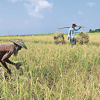Rice production hits record high

Rice production in Bangladesh grew for the sixth consecutive year in fiscal year (FY) 2022-23 as farmers expanded cultivation areas of high-yielding varieties (HYV) and hybrid rice in place of local varieties.
Data released by the Bangladesh Bureau of Statistics (BBS) on the production of dry season crop Boro this week showed that the country bagged 2.07 crore tonnes of the staple grain during the Boro season in FY23, up 3 percent from the previous fiscal year.
Total rice production grew 2.5 percent year-on-year to 3.91 crore tonnes, the highest on record, in FY23.
"We have seen the introduction and cultivation of new varieties of modern seeds with higher yields. Farmers are managing fields better. Besides, the use of fertiliser has become balanced after the government introduced a subsidy for non-urea fertiliser," said Jiban Krishna Biswas, former director general of Bangladesh Rice Research Institute (BRRI).
"Overall field observation has become intensive. Farmers are taking more care of their crops to ensure food security for their families and to make some profit by selling surplus grains in the market," he said.
Seven years ago, Bangladesh's total production of rice was 3.38 crore tonnes.
The overall yield has been soaring since FY2018 thanks to an increase in gross rice-planting area and higher acreage of modern varieties, a development that has reduced import requirements for the cereal.
Private and public agencies imported 10.5 lakh tonnes of rice in FY23, which was marginally higher than the previous fiscal year.
However, between July 1 and October 12 of the current fiscal 2023-24, Bangladesh's rice imports stood at zero, which analysts said was because of increased yields in the last fiscal year.
Mohammad Jahangir Alam, a professor of agribusiness and marketing at the Bangladesh Agricultural University, said higher production had cut the requirement for imports, reducing the burden at a time when the country's foreign exchange reserve is under pressure due to a US dollar shortage.
"This has reduced the requirement for foreign exchange for imports of the grain. Had there been falling production and fewer imports owing to the dollar shortage, prices of rice would have increased and hurt poor people. This is not happening," he said.
"I feel very comfortable as prices are stable," added Alam.
He said Bangladesh is the third-biggest rice-producing country and could expand its output because of the government's focus on agriculture.
Data from the BBS showed that area under HYV varieties of rice seeds in all crop seasons combined grew to 81 percent of the total rice acreage in FY23, up from 73 percent in FY10.
Likewise, area under hybrid rice, which provides higher yields than HYV and local seed varieties, soared from 6 percent in FY10 to 10 percent in FY23.
During the period, cultivation of local rice varieties declined by half, to 9 percent of the total rice area.
Biswas said there is a scope to increase the production of rice by motivating agricultural officials at the grassroots level and ensuring crop insurance for farmers so they are covered in the event of losses owing to natural disasters.
The government also needs to increase focus on agricultural research and motivate agricultural scientists, he said.
In a paper, BRRI said it is working to boost yields to meet the increasing demand for rice as Bangladesh's population has reached nearly 17 crore.
BAU Professor Alam stressed the need for increased production so that the country can meet its domestic requirements without depending on the international market.
"The geopolitical situation is becoming volatile. So, we need to maintain production and growth momentum to ensure food security. To this end, the government needs to ensure imports of agricultural inputs such as fertiliser do not suffer," he said.

 For all latest news, follow The Daily Star's Google News channel.
For all latest news, follow The Daily Star's Google News channel. 








Comments